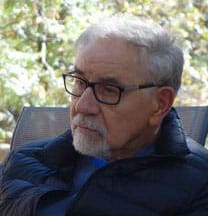“I was born in the 1960s into a typical Soviet Jewish family,” says Svetlana Portnyansky. “We never went to synagogue, never were religious. At family events at home, we sang Jewish songs sometimes, but we’d close all the doors to make sure no one heard us.”
Given Portnyansky’s non-Jewish upbringing, it’s odd that this interview is taking place at Newport Beach’s Temple Isaiah, where she’s the cantor. How did she go from being a popular singer in the Soviet Union to a defector who had to leave her family behind, to a cantor at a shul in Orange County?
Like just about everything else in Portnyansky’s life, the answer has to do with music. Her father was “a musician at heart” who made a living as an industrial engineer in Moscow. “He taught me piano,” she says. “I grew up with music and absorbed it in my soul. I knew that I was born to be a professional singer. So I went to the Moscow Conservatory of Music, graduated with honors and became a singer who specializes in Jewish songs.”
After graduating, she was invited to sing at the Moscow Jewish Theater. This was in the late 1980s, during Perestroika, and it was the theater’s grand reopening after having been closed for 40 years.
“I sang a solo concert,” Portnyansky says, “and my musical career took off. I became a public figure, sang on nationwide radio and television. It was wonderful to be popular, but it was also dangerous: I received threatening letters saying things like, ‘Jews are supposed to be in Israel. Go home! This is our country!'”
Portnyansky felt it was time to leave. “I didn’t see any future for myself in the Soviet Union. I couldn’t see how I was going to live that way, being threatened. Besides, I’d always wanted to go to America.”
Ever since she was a little girl, she says, she dreamed of coming to the United States. “My parents used to get a magazine called Amerika. It had photos and articles about the U.S. In my mind I was already there, from the first grade.”
The opportunity came in 1991, during the last throes of the Soviet Union: She received an invitation from the U.S government to do a concert tour.
“My musicians and I got theatrical exchange visas. I knew I was going to defect. I talked it over with my family. I said to them, ‘It’s our only chance. I have to take it now.’ They understood. They blessed me.” Portnyansky was in her mid-20s then, with a 4-year-old son who stayed in Moscow with her husband and her parents.
“In the U.S. we had some very successful concerts, East Coast to West Coast. The tour lasted two months. When it was over, I told my musicians I would go back [to the Soviet Union], but not just yet. Of course, I knew I wasn’t going back.”
She defected, and during those first few months in New York it was very difficult not being with her family. But she had some money, and she had friends who let her stay in their place. “That was the hardest time of my life,” she says. “I called my family very often. It was also a period of concern, whether I would make the right choices. I was determined not to do certain things, like wash dishes or sing at a restaurant.”
After much thought, she decided to pursue a second Jewish musical track, one that paralleled her pop singing career: She would study to become a cantor at New York’s Jewish Theological Seminary.
In order to become a legal resident of the United States, she contacted the Hebrew Immigrant Aid Society (HIAS) and told them that she could not go back to the Soviet Union. She showed them the threatening letters she’d received. HIAS took up her case.
During the months she was in New York without her family, Portnyansky got word that her father had died in Moscow. She couldn’t risk going to the funeral. “I didn’t have the green card,” she says. “I was afraid I might not be permitted to come back to the United States.”
But in early 1992, Portnyansky’s family found a way to join her: Her husband, son and mother came to the United States on tourist visas. They moved to Southern California, where Portnyansky gave birth to a second son and continued her cantorial studies.
During the early 1990s, though she was not yet a legal resident, HIAS’s advocacy bore results: She was permitted to work in the U.S. She gave “jazzy, cabaret-style” concerts; and, after completing her liturgical training, she started to work as a cantor. “I was busy at that time,” she says. “My only problem was that I couldn’t leave the United States.”
Getting her green card took more than five years. She later found out that the process had been delayed because her file had been lost. After Portnyansky became a legal resident in 1996, her first trip was to Israel. Since then she’s continued her dual career: cantor in Newport Beach … and
Did you enjoy this article?
You'll love our roundtable.
Editor's Picks



What Ever Happened to the LA Times?

Who Are the Jews On Joe Biden’s Cabinet?


No Labels: The Group Fighting for the Political Center
Latest Articles

Passover 2024: The Four Difficulties

Israel Strikes Deep Inside Iran

NSFW – A Poem for Parsha Metzora

Israel War Room Launches in Spanish

Modern Book Bans Echo Past Atrocities and Further Silence Marginalized Voices












 More news and opinions than at a Shabbat dinner, right in your inbox.
More news and opinions than at a Shabbat dinner, right in your inbox.